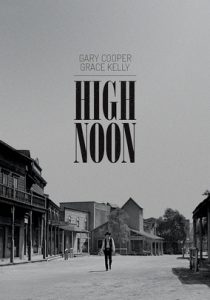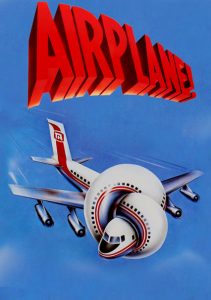High Noon-1952
Director Fred Zinneman
Starring Gary Cooper, Grace Kelly
Top 250 Films #150
Scott’s Review #638
Reviewed April 28, 2017
Grade: A
Billed as a standard Western but much more complex than a film as traditional, basic Western, High Noon accomplished what no other Western did in 1952- adding complexities from different genres, such as suspense and drama, to a film form.
Additionally, High Noon challenged typical Western themes, such as male-driven fights and chases, in favor of a moral and emotional approach, and oh, is the film ever character-driven.
The results are astounding, and to understand and appreciate all its elements, the film should be studied in film school.
High Noon heartily breaks the mold. It was released when mainstream Western was quite popular in the film, adding enormous risk, and the results paid off in spades.
Marshal Will Kane (Gary Cooper) has just wed his beloved bride, Amy (Grace Kelly), in a small ceremony in a tiny town in New Mexico. He plans to turn over his badge and retire to the prairie land with his new wife.
Suddenly, the town receives word that a dastardly villain, Frank Miller, whom Kane once sent away, has been released from a Texas prison and plans to exact revenge on Kane.
Miller is to arrive on the noon train as his three accomplices await his arrival, much to the chagrin of the rest of the town, who become panicked with each passing moment.
The film begins at approximately ten-thirty in the morning and ends shortly after Noon.
High Noon has subtle political themes and clear examples of McCarthyism. However, some dispute this McCarthyism was a campaign launched by Senator Joseph McCarthy, which ended up blacklisting many artists suspected of communism.
The central theme is how people become frightened and blame the attack on one another because of this fear. Our main protagonist (Kane) faces the dire feat of facing four angry gunmen, with revenge on their minds, alone, as an entire town of people chooses not to get involved.
Brilliant is that High Noon more or less takes place in real-time. The inclusion of clocks in the film, and specifically of pendulums swaying back and forth, creates a defined level of tension as character after character nervously glances at the time, knowing full well that with each passing minute, they inch closer and closer to a fantastic and deadly showdown- much blood will be shed.
Cooper, old enough to be Kelly’s grandfather, is noticeable if one chooses to be nitpicky, but the couple works well together, and I bought the happily wedded couple as genuine.
I adore the character of Helen Ramirez, played by actress Katy Jurado. A Mexican character, Ramirez is a prominent businesswoman in the small town, owning a saloon. She is empowered and confident, a character to admire regardless of gender.
A strong female character of Mexican heritage in a 1952 film was relatively uncommon, considering the film is set in the Wild West.
Equally impressive and completely backward for the time, the events of Amy coming to the rescue of Kane, instead of the standard, gender-specific, “man rescues woman,” challenge the norm. Further groundbreaking is that Amy is written as a Quaker woman, not the traditional Christian woman, nor is she skittish or silly.
Western stereotypes are entirely turned upside down, which is arguably way ahead of its time.
Eerie yet highly effective is the use of a “theme song” either sung or in another form (musical score or background music) throughout the film—the song is “Do Not Forsake Me, My Darling,” which became a hit for Texas Ritter.
It is worth mentioning that the success of this added “theme song” encouraged subsequent Westerners to add similar songs to their films.
Challenging the standard in many ways, High Noon sets the bar very high in its thoughtfulness, message, and conflict.
The film exemplifies people who take the world and turn it upside down with fantastic and inspiring results.
Oscar Nominations: 4 wins-Best Motion Picture, Best Director-Fred Zinnemann, Best Actor-Gary Cooper (won), Best Screenplay, Best Scoring of a Dramatic or Comedy Picture (won), Best Song-“The Ballad of High Noon (“Do Not Forsake Me, O My Darlin”)” (won), Best Film Editing (won)

